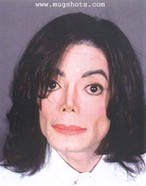
I’ll Be There can also provide the beginnings of an understanding of Michael Jackson’s odd “whitening.”
Whether or not the lightening of his skin color has been caused by some type of disease, as has been claimed, it is impossible to look at photographs of Jackson before and after his long string of elective plastic surgeries without being struck by the profound de-Africanization he willed upon himself.
There also seems to be a related phenomenon in his speech. If you were to hear him on the telephone, the only way you could know he was born black is if you recognized him specifically as Michael Jackson. His pronunciation and his grammar both seem rather meticulously Standard English.
Things weren’t this way in I’ll Be There. It’s a beautiful and moving song, but the lyrics include the following:
I’ll be there.
If he “doesn’t?” “Doesn’t” what? Doesn't be good to you?
The word should be “isn’t,” not “doesn’t”—as in, “If he isn’t good to you, I’ll be there.”
The use of "doesn't" in place of "isn't" doesn't have anything to do with the rhythm of the phrase, since both have the same number of syllables.
I also won’t buy the argument that correcting the grammar might have made the lyrics sound somehow starchy or unnatural. This isn’t a case of trying to impose ludicrous Bowdlerization on a raw lyric like “I ain’t got nobody.” It’s just a clunker, and was fairly plainly written by somebody who didn’t know any better.
The net effect of the song’s unfortunate word choice is to insert an ear-jolting bit of ugliness right in the middle of an otherwise wonderfully crafted piece of music.
It is significant that today’s Michael Jackson has put errors of this sort behind him.
Why has he become so conscientious in this regard? Well, partly, no doubt, for the same reasons that anyone else might feel a twinge of embarrassment over a mistake that introjects crudeness or clumsiness into an otherwise polished piece of work. We probably all wince over things like that.
But in Jackson's case, excising any suggestion of Ebonics from his speech has occurred in combination with a long series of plastic surgeries targeted at eliminating negritude.
This is why, with all due respect to some black people I've known who claim that Jackson’s self-mutilation primarily reflects the cold realities of what white music consumers can and can’t relate to, I would submit that there is something more intensely personal that can better account for Michael Jackson’s renunciation of so many aspects of his race.
I’ll need to ask the indulgence of black readers at this point, because although what I’m about to say is not meant in any negative way, it is also probably not something I would be allowed to say in advertiser-supported mass media. (Being able to speak frankly when called for is one of the few benefits of writing in an unpaid capacity for a largely unknown outlet.)
The unfortunate reality that I feel needs to be pointed out is that the young Michael Jackson was called on to woo and seduce his audiences in a manner that is more difficult to imagine being imposed on a white kid.
Perhaps questions about appropriateness of the material for a child were overlooked among his earlier, predominantly black audiences because people who were more likely to have had dreams dashed, at an earlier age, than a comparable crowd of white suburbanites found the poignancy of songs like I’ll Be There harder to resist. Then again, maybe the excitement of seeing “one of ours” with such obvious talent and such an excellent chance of making it to the top affected people’s judgment.
Whatever the reasons for initial audiences’ acceptance of the role Michael Jackson was put in, there are also other aspects of his early performing experience that require no subtle exploration of latent symbolism or psychological overtones to recognize as inappropriate for a child.
The careers of the Jackson Five got seriously underway in1966 when Michael, the lead singer, was only about eight years old. After winning a major talent contest, the Jacksons began touring beyond their home state of Indiana, playing Chicago and a number of eastern cities, and focusing largely on a string of black clubs known as the “chitlin’ circuit.”
These were nightclubs for adults, and they exposed young Michael to a good deal more than smoking and drinking. Sometimes when the kids played these clubs, they opened for strippers.
Again, this may not be politically correct to ask, but how many white children would have been exposed to this type of environment?
Given his history, when he later began an apparent attempt to reclaim his innocence, would it have been all that unnatural for Michael to associate his blackness with something crude or coarse—i.e., something that made it more difficult to attain the lost purity he craved?


